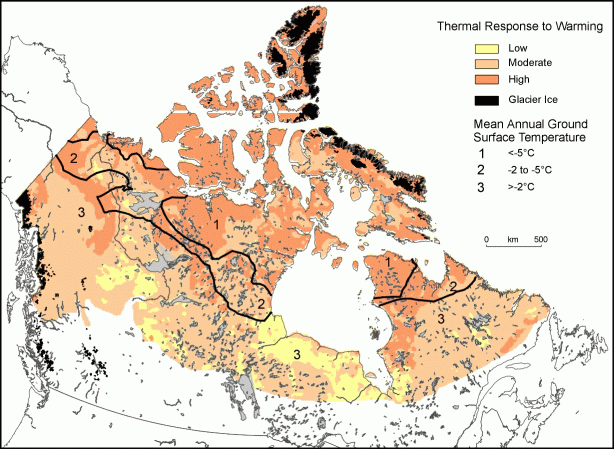Human life would not be sustainable without fertile lands producing the necessary foods we eat and hosting the organic and inorganic materials used for shelter, tools, and medicines. Canada’s total area is 9,984,670 km2 where 9,093,507 km2 or about 91% of it is land and 8% is freshwater (Natural Resources Canada, 2005). It is used for agricultural, hunting and gathering, travel routes, tourism, resource extractions, and leisure. Land is therapeutic as it is intertwined socially, economically, spiritually, and biologically to human health (Gesler 1992; Gesler 1993; Williams 1998).
Figure 1. Canadian Cryosphere Information Network. Susceptibility of permafrost regions to warming temperatures.
Scientists are engaged in research to further our scientific understanding of the impacts that climate-induced erosion has on land and its uses. Natural Resources Canada estimates that the continuous rise in atmospheric CO2 concentrations, due to human sources, may increase the temperature by several degrees over much of the Arctic. Permafrost regions can be highly, moderately, or lowly susceptible to thawing within a 1-2 degree temperature increase (see Figure 1). Climate Change impacts on permafrost regions are being monitored as many northern First Nations and Inuit communities reside on these sites. Land areas that are unstable upon thaw (land erosion, slope failure) pose a concern as they may have safety implications for existing homes and infrastructure. Understanding the changing landscape is also important for communities as they rely on the land to safely hunt, gather country foods, travel to see loved ones, and for healing.
Health Canada’s Climate Change and Health Adaptation Program proudly supported two community-led projects on land erosion and land use. Northern communities recognize that these changes are having impacts on their way of life and are working towards finding means to connect the guidance of the past with the new requirements of life today. Their stories tell of ways in which traditional and scientific knowledge are collaborating to provide greater insight into climate change impacts on land use and erosion and of ways they are adapting to these changes to ensure the health and well-being of their communities.
References: Canadian Cryosphere Information Network Permafrost Map.
http://www.socc.ca/cms/en/socc/permafrost/futurePermafrost.aspx Gesler, W. Therapeutic landscapes: Medical issues in light of the new cultural geography. Social Science & Medicine 1992; 34(7):735–746. Gesler, W. Therapeutic landscapes: Theory and a case study of Epidauros, Greece. Environment and Planning D: Society and Space 1993; 11:171–189. Williams, A. Therapeutic Landscapes in Holistic Medicine. Social Science Medicine 1998; 46(9):1193-1203.

